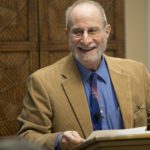
By Dr. Joseph Chuman
In my May Focus column I raised the issue of accountability. More specifically, I asked the question: To whom are humanists accountable? I want to pursue this question as a lead-in to my June address.
I noted that theists are ultimately accountable to their creator. Humanists, by contrast, extend their accountability to other humans, or perhaps, beyond humanity, to the realm of nature.
But this conclusion opens the door to additional inquiry. Are we primarily accountable to ourselves alone? I recall that in the 1960s “self-realization” was in the forefront of humanist psychology and attracted a lot of attention in an era when the watchword of which was “change.” But is this sufficient?
Within the context of accountability to ourselves, need we primarily be loyal to our conscience? There is a something assuredly high-minded and noble about that. But what if loyalty to our individual conscience results in bringing palpable harm to others? Can invoking the demands of conscience paradoxically be an act of selfishness?
Or, are we primarily accountable to the well-being of others?
These alternatives and the matrix that gives rise to them are certainly very thick with ethical substance. The matrix that I allude to relates to the question of whether we are primarily individuals, or primarily social and communal beings. If the former, then we may not be accountable to anyone but ourselves alone. If the latter, then we begin to speak the language of obligation, duty and responsibility.
Speaking personally, I have changed as I have grown older. In the brashness of youth, I was much committed to the assertion of individualism. And in many ways, I so remain. I remain deeply committed to civil liberties and human rights, and rights are prevailingly the possession of individual persons. Protection of individual rights is necessary for the endurance of liberty and freedom.
But at a deeper level, I am by no means committed to radical individualism. In my philosophy of the human being, I have become much more the communitarian. I have become increasingly aware of how our lives, our identities, our values and characters are dependent on others. This is true (somewhat paradoxically) even for our freedom. Without human community and the context it provides for us, there can be no freedom. Without community, there can be no individual.
This social understanding of the human person points us in an ethical direction and molds our values. It suggests that in addition to individual rights we also have duties to others. “Duty” for many often carries negative connotations. At first look, it suggests joylessness, perhaps even oppression. But this negativism, I believe, is not totally warranted. Through meeting our just obligations to others, I believe we deepen our characters and we place ourselves in the thick of social and human relations. We, perhaps, take life more seriously. And I don’t think that is a bad thing.
Indeed, we live our lives on a continuum between individualism and communalism. Each, brought to an extreme, has its dangers. The extreme individualist places himself or herself against society and perhaps outside of it. He has no roots and ultimately feels nowhere at home. He is alienated and, we suspect, lonely. Self-righteous, perhaps, but also bereft of the warmth of deeper relationships and love that bespeak the richness of the human bond.
The communitarian outlook is also not without its dangers. Brought to its extreme, a person can be essentially absorbed into the group, and rob herself of the creativity and self-confidence that a healthy individualism can bring. On the level of society, an ethics of duty gone too far can lead to herd conformity, unwarranted obedience to authority and ultimately to malignant forms of authoritarianism, nationalism and fascism. Politically, we must never let go of dissent, which is born out of a necessary individualism. It remains a requirement of democracy and freedom.
As human beings, we live out our lives between these two dispositions and the values they bring. And as we shape the kinds of people we wish to be, we can bring greater emphasis to one or the other.
In my address on June 2, I hope to explore these ideas further. I have titled my address “Is It About Me or Us? How Should I Direct My Life?” I hope you can join me then.
Dr. Joseph Chuman is leader of the Ethical Culture Society of Bergen County.


